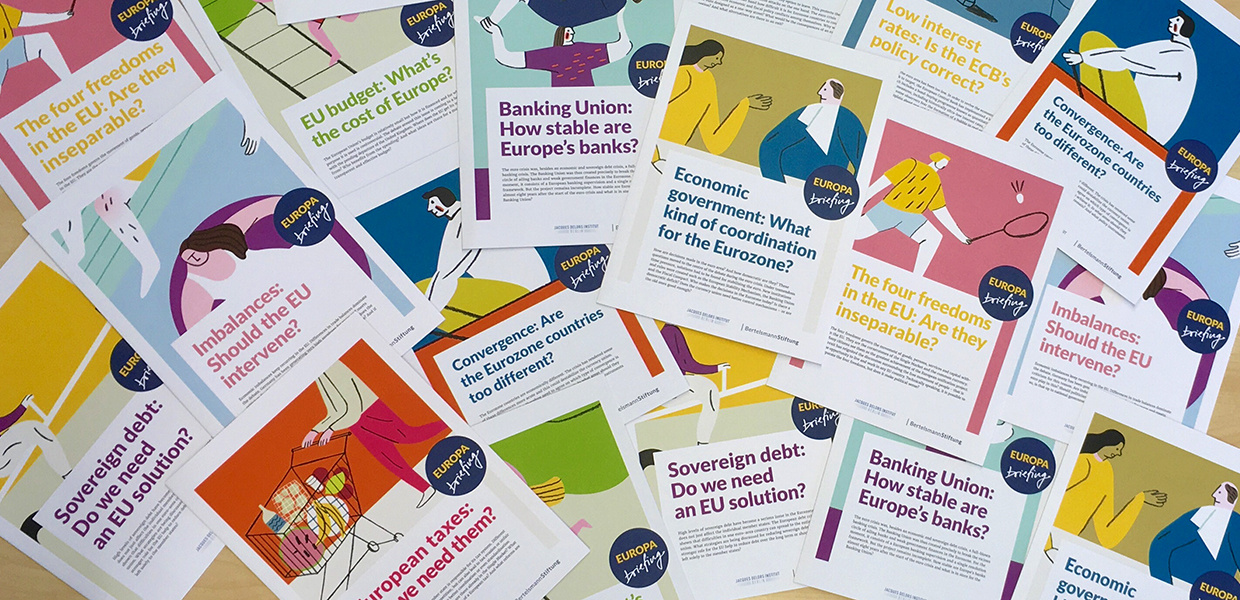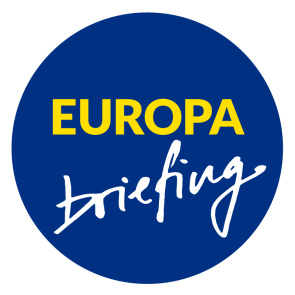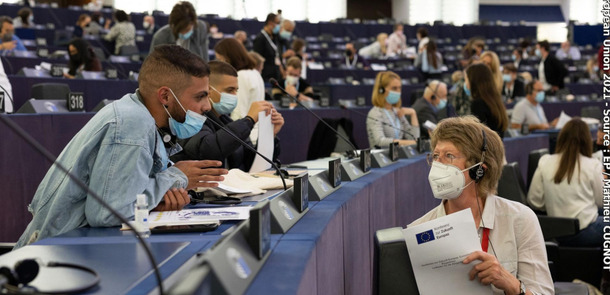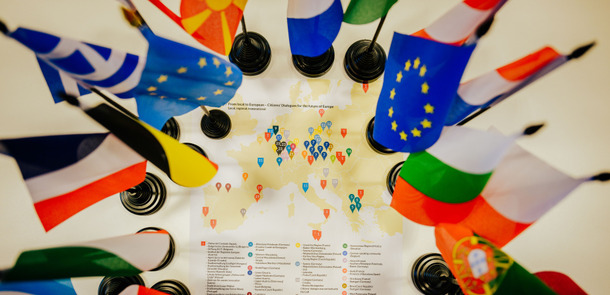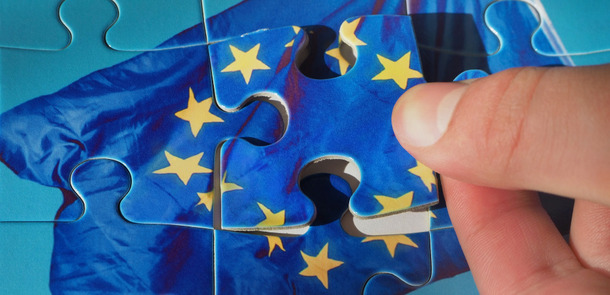In the publication series “Europa Briefing”, the Bertelsmann Stiftung and the Jacques Delors Institut – Berlin cover key topics of European politics and present possible scenarios: What is the problem? What might happen next? And what can politics do now?
The debate is on: In the coming months, Europe’s leaders might take far-reaching decisions on the future of Europe and the euro. Discussions often get caught between very technical details and political polemics. This is where our Europa Briefings come into play. The ten-piece poster series explains key terms in the current debate on the future of Europe and the euro. We explain what the problem is, what possible scenarios there are to move ahead, and what policy-makers can do now to enable an informed dialogue.
Economic government. During the euro crisis, decisions had to be made under enormous time pressure. Various new institutions and rules were created, such as the ESM, the Banking Union and the Fiscal Compact. This briefing looks at how decisions in the Eurozone are made today and whether there is a democratic deficit. It examines whether the currency union needs new and better control mechanisms – maybe even up to the point of a genuine European economic government.
European taxes. In recent years, tax evasion scandals brought the topic of tax regime differences in Europe back to the centre of public interest. In the EU, each member state is responsible for its own tax system. That stimulates tax competition, but it can also trigger tax evasion or create unfair rules in the Single Market. This briefing explains what types of tax regulations already exist in the Single Market and which reforms are currently under discussion. Looking to the future, it also discusses the arguments in favour and against European taxes.
Sovereign debt. High levels of sovereign debt have become a hotly-debated issue in the Eurozone. The euro crisis has shown how difficulties in one euro-area country can spread to the entire currency union. This briefing outlines different strategies for reducing sovereign debt. In particular, it looks at whether a stronger role for the EU could help to reduce debt – or whether this should be left to the member states.
Imbalances are a recurring problem in the EU. Especially differences in trade balances dominate the debate. Germany, for instance, has been generating very high surpluses for years and meets serious criticism for this reason. This briefing examines whether imbalances pose a threat to the EU and what role the euro plays in this. It also asks whether politicians should redress differences in the balance of trade - and if so, whether that is up to national governments or the EU.
The EU Budget. Although the EU budget is comparatively small, it remains a controversial topic. Brexit will further fuel the debate on rebates and redistribution. This briefing takes a closer look at where the EU gets its money from and who benefits most from its spending. It also examines current proposals to render the budget more transparent and efficient.
The four freedoms serve as the cornerstones of the Single Market and the euro. They state that goods, services, capital and persons can move without restriction within the EU and for many citizens, they are the greatest achievement of European integration. Meanwhile, Brexit has reignited a heated debate on the indivisibility of the four freedoms and on the free movement of persons in particular. This briefing looks at the crucial question whether the (technically possible) separation of the four freedoms would make any political sense and examines the consequences such a decision would bear.
Leaving the euro. Up to now, the European Treaties provide no option for leaving the euro. While this protects the currency from speculative attacks, the lack of an exit option also constrains the room for political manoeuvre in times of crisis. This briefing looks at why the euro was designed as a one-way-street, examines the potential consequences if an exit option was introduced and provides alternative scenarios to a full-blown exit.
The Banking Unionwas established in 2012 to break the vicious cycle of fragile banks and weak public finances in the euro area. However, some key elements necessary for its completion are still missing. This briefing analyses further steps needed in order to complete the Banking Union and looks at how stable European banks are almost a decade after the crisis.
Convergence.The crisis has made some of long existing economic differences between Eurozone members more acute. As this could further destabilize the currency union, an important question is how to relaunch convergence in the Eurozone. Our briefing explains in which areas the euro countries need to converge. It asks what differences could or should remain and it looks at the necessary instruments to achieve this.
Low interest rates. Over the past year, the ECB has implemented a low interest rate policy in order to revive the economy and stabilise inflation in the euro area. This includes an asset-buying program known as quantitative easing or QE. However, these measures do not come without risk: Critics fear the formation of financial bubbles or complain about one-sided capital gains for wealthy households. This briefing examines how imminent such risks are, what the worst case scenario could be and presents options for governments to get inflation back to target.
